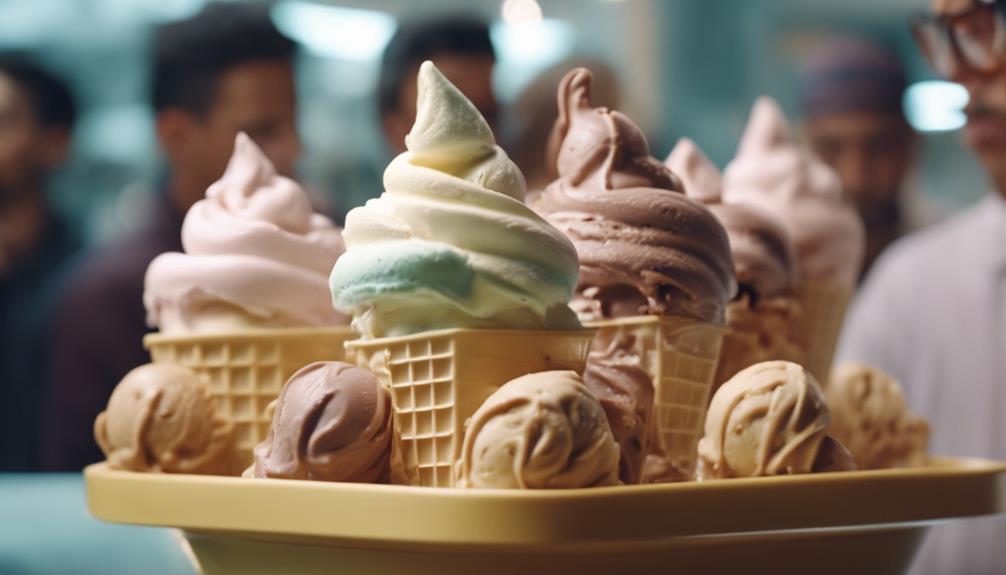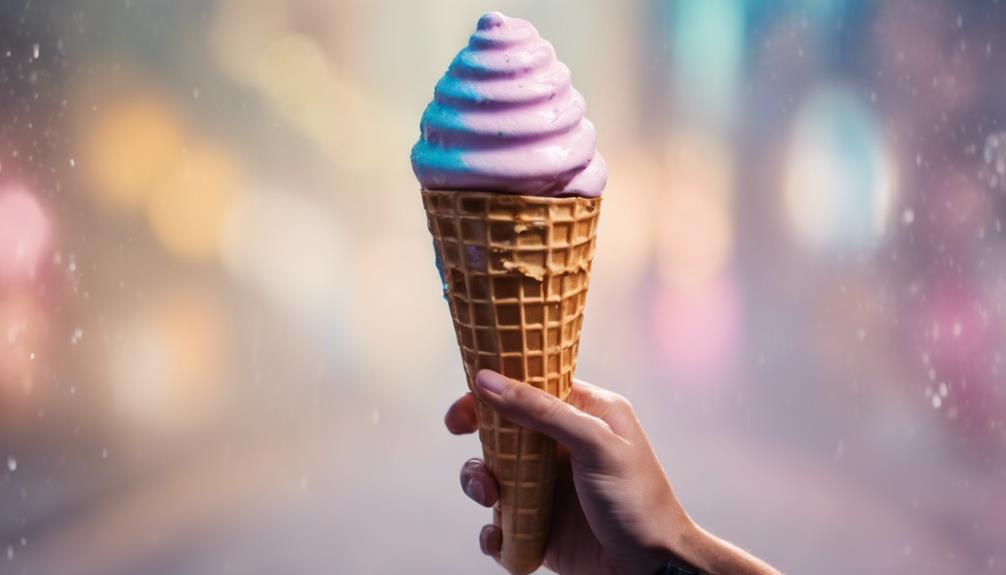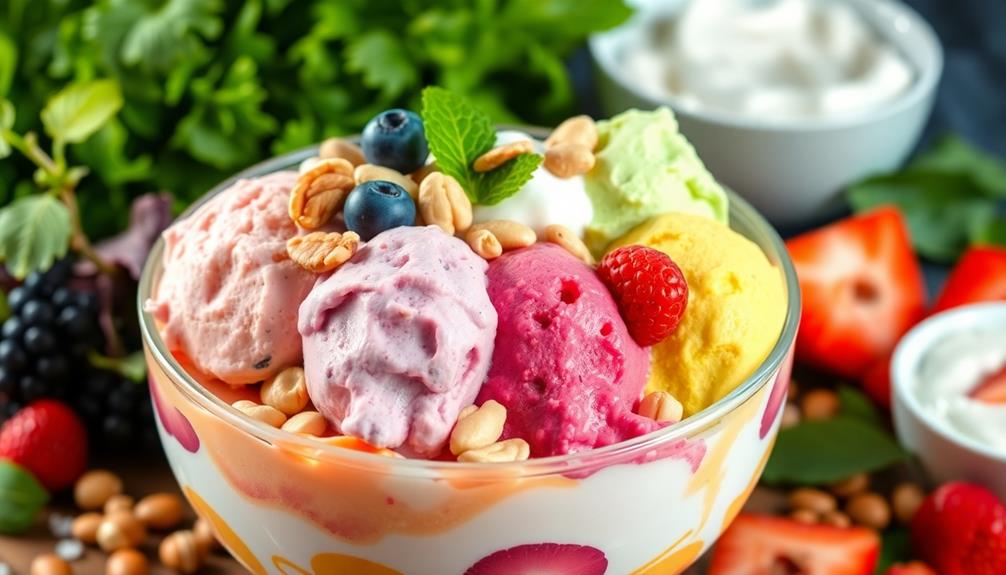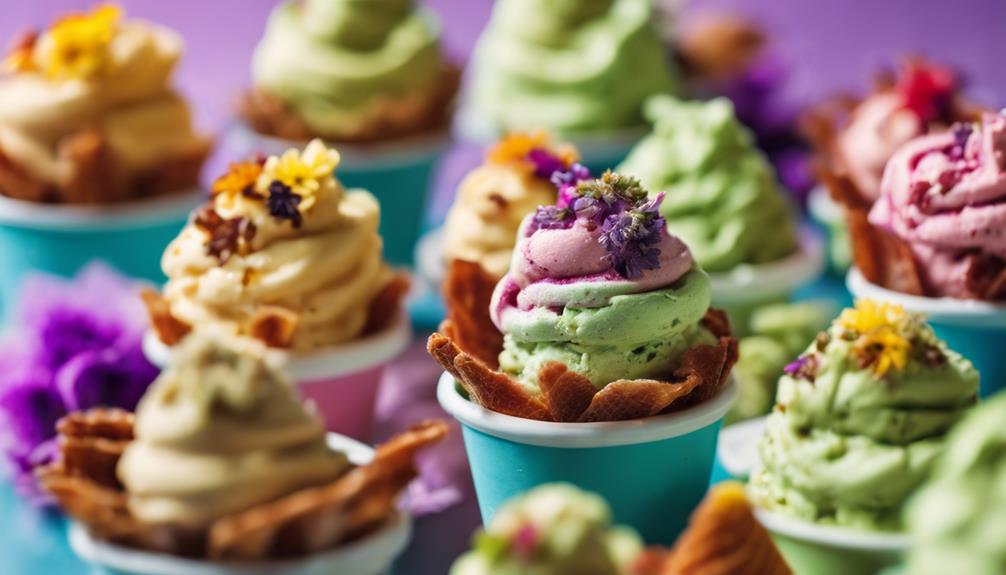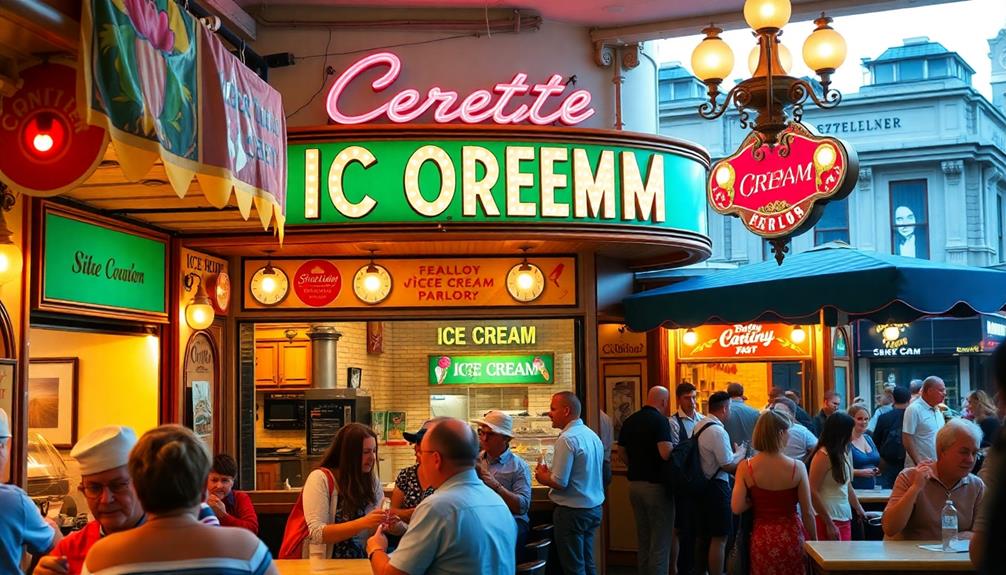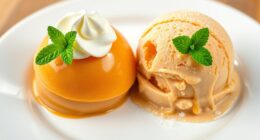In order to ensure that ice cream is halal, it is important to avoid ingredients such as alcohol and pork derivatives. Every aspect, from additives to flavorings, must adhere to halal standards. Certification confirms compliance with Islamic dietary laws, providing consumers with assurance of the halal status. It is crucial for manufacturers to comprehend these criteria and procedures. Halal certification logos signify adherence to specific standards. By obtaining halal certification, ice cream producers exhibit their commitment to meeting halal criteria and ensuring product integrity. Further exploration of halal ice cream requirements and certification will enhance understanding of the thorough process involved.
Key Takeaways
- Halal ice cream must exclude haram ingredients like alcohol and pork derivatives.
- Certification involves verifying all ingredients, additives, and production processes for halal compliance.
- Indonesia's law mandates halal certification for ice cream by 2024 to ensure adherence to Islamic dietary laws.
- Compliance with halal standards reassures consumers of ingredient purity and adherence to dietary guidelines.
- Halal certification involves rigorous inspections and audits to maintain halal integrity in ice cream production.
Halal Ice Cream Requirements

To make sure ice cream meets halal requirements, it must be free from haram ingredients like alcohol and pork derivatives. When it comes to halal ice cream products, adherence to Islamic dietary laws is essential. This means that all ingredients used in the production of halal ice cream must comply with halal standards.
From additives to flavorings and stabilizers, every component needs to be halal-certified to guarantee the final product is permissible for consumption according to Islamic principles.
Halal certification for ice cream plays a pivotal role in verifying that manufacturers are following the necessary guidelines throughout the manufacturing process. By obtaining halal certification, ice cream producers demonstrate their dedication to meeting the specific requirements outlined by Islamic dietary laws.
Consumers seeking halal ice cream can look for official halal certification logos on packaging as a reliable indicator of compliance with halal standards. By understanding these halal ice cream requirements, you can make informed choices aligning with your dietary preferences and beliefs.
Certification Process Overview
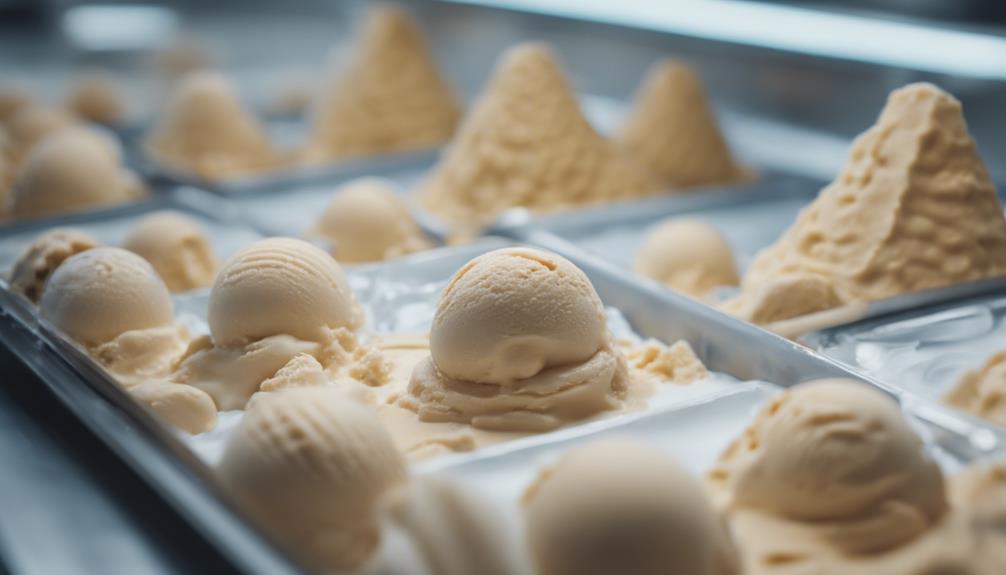
Understanding the certification process for halal ice cream involves a thorough evaluation of ingredients, facilities, and production methods to guarantee compliance with Islamic dietary laws. The certification process is an in-depth assessment that covers the entire supply chain, from sourcing raw materials to the distribution of final ice cream products.
Manufacturers seeking halal certification must make sure that all ice cream ingredients are free from alcohol and pork-derived components. Regular inspections are conducted to verify and maintain compliance with halal standards throughout the ice cream production process.
Halal certification logos displayed on ice cream packaging serve as indicators of adherence to specific requirements and standards set forth by Islamic dietary laws. By following these strict protocols and undergoing the halal certification process, ice cream manufacturers can reassure consumers that their products meet the necessary criteria to be considered halal.
Indonesia's Halal Certification Law
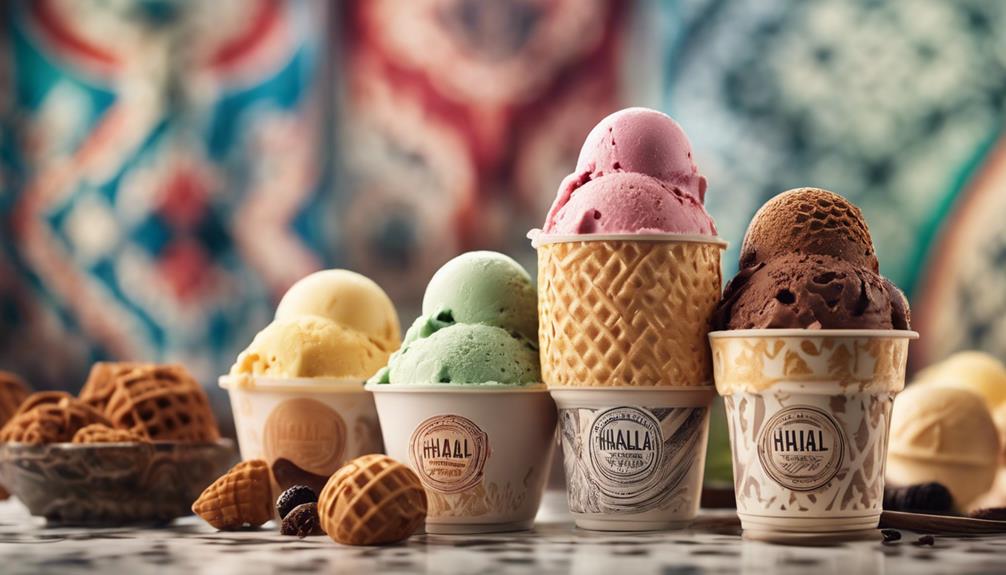
Indonesia's Law Number 33 of 2014 mandates halal certification for products traded within the country, including ice cream by 2024. This regulation requires ice cream manufacturers to comply with halal certification standards to guarantee the absence of haram or forbidden ingredients in their products.
Adhering to these regulations is essential for maintaining consumer trust and meeting the country's halal certification requirements. By obtaining halal certification, ice cream producers demonstrate their dedication to producing products that align with Islamic dietary laws.
This certification process involves rigorous inspections and audits to verify that all ingredients and production processes meet the necessary halal standards. Failure to comply with Indonesia's halal certification law can result in penalties and loss of market access, making it vital for ice cream manufacturers to prioritize halal compliance to continue operating in the Indonesian market.
Essential Ice Cream Ingredients
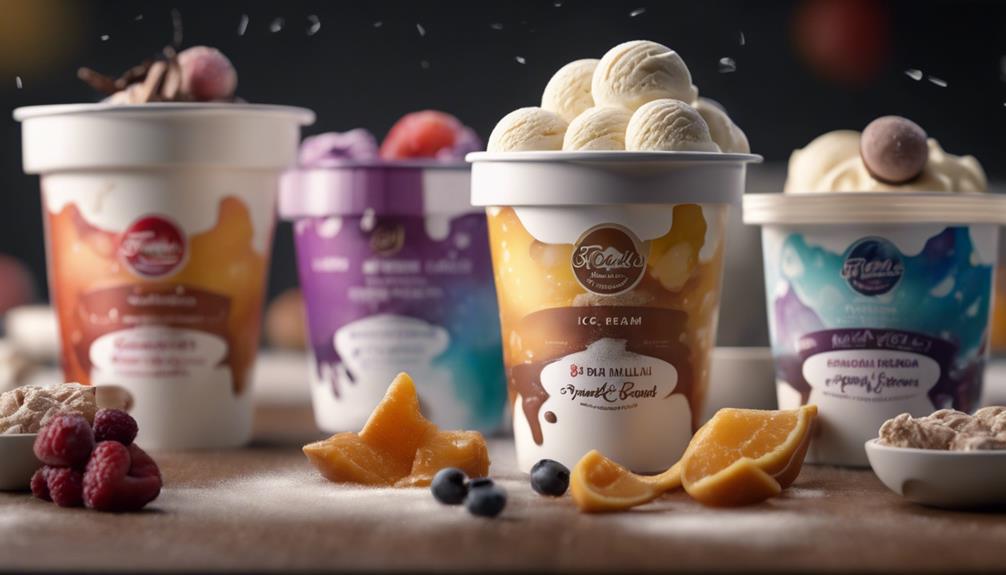
Let's talk about the vital components that make up ice cream and the specific criteria for halal ingredients. Understanding the key ingredients like milk fat, non-fat solids, sweeteners, stabilizers, and emulsifiers is essential for producing high-quality ice cream.
These components not only contribute to the taste and texture but also play a significant role in meeting halal certification requirements.
Key Ice Cream Components
Ice cream comprises necessary components, including dairy products like milk fat and non-fat milk solids, sweeteners such as sugar, stabilizers to prevent ice crystal formation, emulsifiers, and flavorings.
Milk fat not only adds richness but also affects the texture and consistency of ice cream. Sweeteners like sugar impact both the sweetness level and freezing point of the ice cream. Stabilizers play an essential role in maintaining the structure of ice cream by preventing ice crystals from forming and ensuring a smooth texture.
Emulsifiers are responsible for binding water and fat together, contributing to the overall creaminess of the ice cream. Additionally, flavorings enhance the taste and aroma of the ice cream, making it more appealing to consumers.
Each of these components plays a crucial role in creating the delightful frozen treat that's enjoyed worldwide.
Halal Ingredient Criteria
To ensure ice cream meets halal requirements, attention must be given to the criteria for important ingredients like milk fat, sweeteners, stabilizers, and emulsifiers. These ingredients play a vital role in determining the overall quality and halal status of the final product.
When it comes to halal ice cream, confirming that the milk fat content and non-fat solid milk components are sourced from permissible origins is crucial. Additionally, sweeteners, stabilizers, and emulsifiers must undergo thorough verification to confirm their compliance with halal standards.
Balancing these ingredients while selecting only halal-approved options is essential in the production of halal ice cream. By carefully monitoring and selecting the ingredients used, manufacturers can maintain the integrity of their halal-certified products.
Proper utilization of these important components not only guarantees the halal status of the ice cream but also contributes to achieving the desired taste, texture, and overall quality of the final product.
Milk Fat and Ice Cream Quality
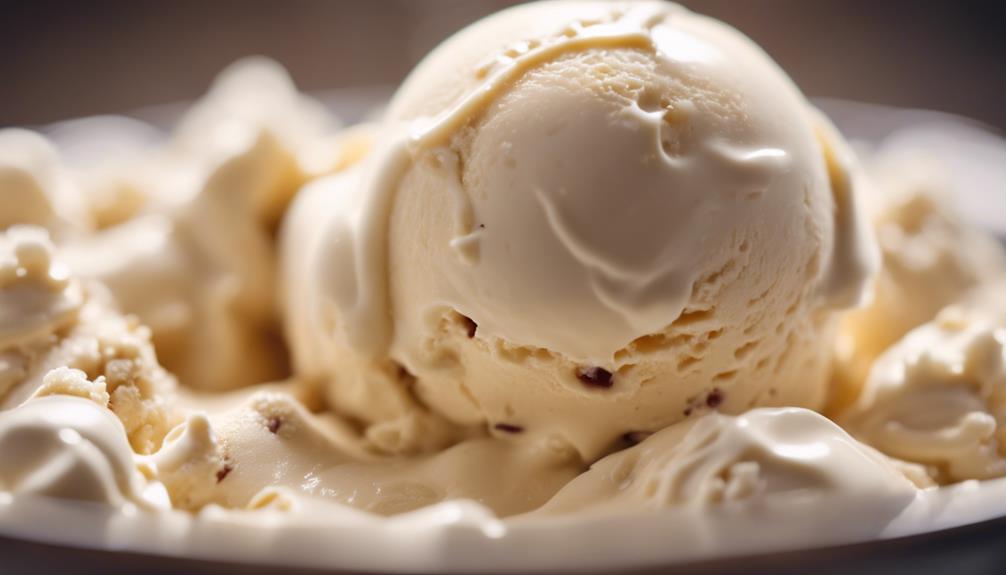
Achieving the best milk fat levels is important for maintaining the taste, texture, and overall quality of ice cream products. The milk fat content in ice cream plays a pivotal role in influencing its flavor profile, texture, and how it melts.
Higher milk fat percentages typically result in a richer and creamier ice cream experience. Maintaining proper milk fat levels is crucial for achieving the desired consistency and quality in ice cream products.
Additionally, milk fat serves a functional purpose in lubricating containers during the industrial production of ice cream. Finding the right balance of milk fat isn't only significant for the general quality of ice cream but also for producing high-quality halal-certified ice cream.
This balance ensures a smooth and creamy texture, meeting the standards required for halal ice cream production. Properly managing milk fat content is key to creating delicious and halal-compliant ice cream options.
Sweeteners and Stabilizers Impact
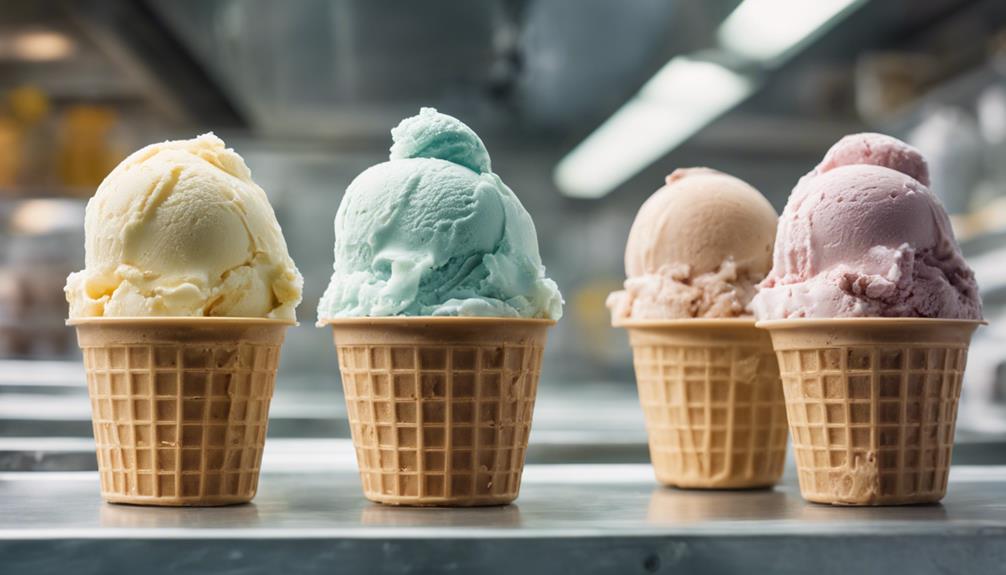
Maintaining the right balance of sweeteners and stabilizers is vital for guaranteeing the taste and texture of halal-certified ice cream meet the required standards.
When it comes to sweeteners and stabilizers in ice cream, here's what you need to know:
- Sweeteners Impact: Sweeteners like sugar not only contribute to the sweetness of ice cream but also play an important role in determining the freezing point, which directly affects the texture of the final product.
- Stabilizers Effect: Stabilizers such as gums and gelatin are crucial in preventing ice crystal formation, enhancing stability, and extending the shelf life of ice cream, ensuring it maintains its desired consistency.
- Halal Certification Importance: Proper use of sweeteners and stabilizers is key in meeting halal certification requirements for ice cream. Halal certification involves verifying the sources and processing methods of these ingredients to guarantee they comply with halal standards.
Critical Emulsifiers in Ice Cream
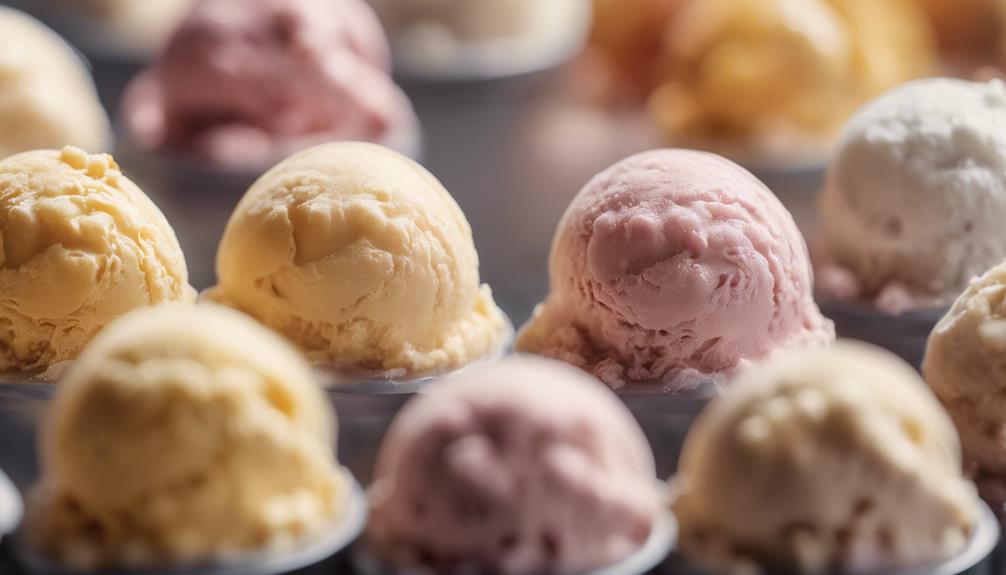
Emulsifiers like mono- and diglycerides play an important role in ensuring the stability of fat and water in ice cream. These compounds act as intermediaries between the fat and water molecules, preventing them from separating and creating a smooth texture. Emulsifiers also help in preventing the formation of ice crystals in ice cream, contributing to a creamy and enjoyable mouthfeel. When it comes to halal certification, it is vital that the emulsifiers used in ice cream are sourced from permissible ingredients to meet the dietary requirements.
To better understand the significance of emulsifiers in ice cream, take a look at the table below:
| Emulsifiers | Function | Importance in Ice Cream |
|---|---|---|
| Mono- & Diglycerides | Stabilize fat & water | Prevent separation, smooth texture |
| Lecithin | Enhance emulsification | Improve consistency |
| Polysorbate | Bind ingredients | Enhance mouthfeel |
Emulsifiers not only bind the ingredients together but also play a significant role in maintaining the quality and consistency of halal-certified ice cream.
Understanding Halal Compliance
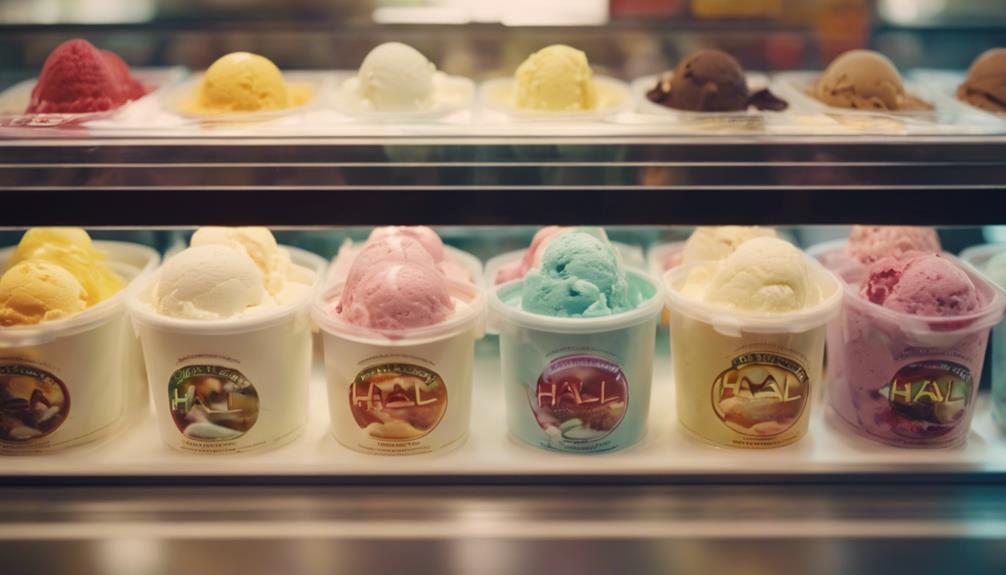
To comprehend the intricacies of halal compliance in ice cream production, one must grasp the fundamental principles of Islamic dietary laws. When safeguarding ice cream's halal status, adhering to Islamic dietary regulations is paramount.
Here's what you need to know:
- Ingredients Scrutiny: Halal compliance involves meticulous scrutiny of all ingredients to confirm they don't contain any haram components like alcohol or pork derivatives.
- Facility Evaluation: Certification entails a thorough assessment of production facilities and processes to assure they align with Islamic dietary laws.
- End-to-End Verification: Halal certification for ice cream spans the entire supply chain, from sourcing raw materials to the distribution of the final product, guaranteeing consistent compliance.
Ice Cream Halal Certification Importance

You need to understand the significance of halal certification for ice cream.
It guarantees compliance with Islamic dietary laws, verifying the absence of forbidden ingredients like pork and alcohol.
This certification is vital for building consumer trust and assuring ingredient compliance.
Halal Certification Significance
Understanding the significance of halal certification for ice cream is fundamental for both consumers and manufacturers in ensuring compliance with Islamic dietary laws. Here's why it matters:
- Compliance with Islamic Dietary Guidelines: Halal certification guarantees that ice cream adheres to the strict dietary requirements of Islam, providing assurance to Muslim consumers that the product meets their religious standards.
- Assurance of Ingredient Purity: The certification signifies the absence of haram (forbidden) ingredients in the entire production chain, ensuring that only permissible components are used in the making of ice cream.
- Consumer Trust and Regulatory Adherence: Halal certification isn't only about meeting religious obligations but also about building consumer trust and meeting regulatory requirements. It demonstrates a commitment to quality and transparency in the manufacturing process, which is vital for both consumers and regulatory bodies.
Ingredient Compliance Verification
Verifying ingredient compliance is a critical aspect of obtaining Halal certification for ice cream production. Validation of ingredient adherence is essential to make certain that all components used in making the ice cream adhere to Islamic dietary laws.
Halal certification guarantees that the ice cream doesn't contain any haram (forbidden) ingredients, providing assurance to consumers who follow Halal dietary guidelines.
Validation processes involve rigorous inspections and checks to confirm that all ingredients meet the necessary standards for certification. This scrutiny is fundamental in maintaining the integrity of the certification and upholding consumer trust in the product.
Consumer Trust Assurance
To reinforce consumer trust and confidence in ice cream products, understanding the significance of Halal certification is paramount. Halal certification plays a vital role in assuring consumers that the ice cream they're consuming complies with Islamic dietary laws.
Here are three key reasons why Halal certification is essential for maintaining consumer trust:
- Compliance with Islamic Dietary Laws: Halal certification ensures that the ice cream is free from any haram (forbidden) ingredients, meeting the strict requirements set forth by Islamic dietary laws.
- Consumer Trust: By displaying the Halal certification, ice cream manufacturers instill confidence in consumers, especially those who adhere to Halal dietary guidelines, that the product is permissible for consumption.
- Regulatory Requirements: Obtaining Halal certification isn't only about meeting consumer preferences but also about adhering to regulatory standards, making it necessary for ice cream manufacturers to cater to Muslim consumers and maintain their trust.
Bulla Ice Cream Halal Verification
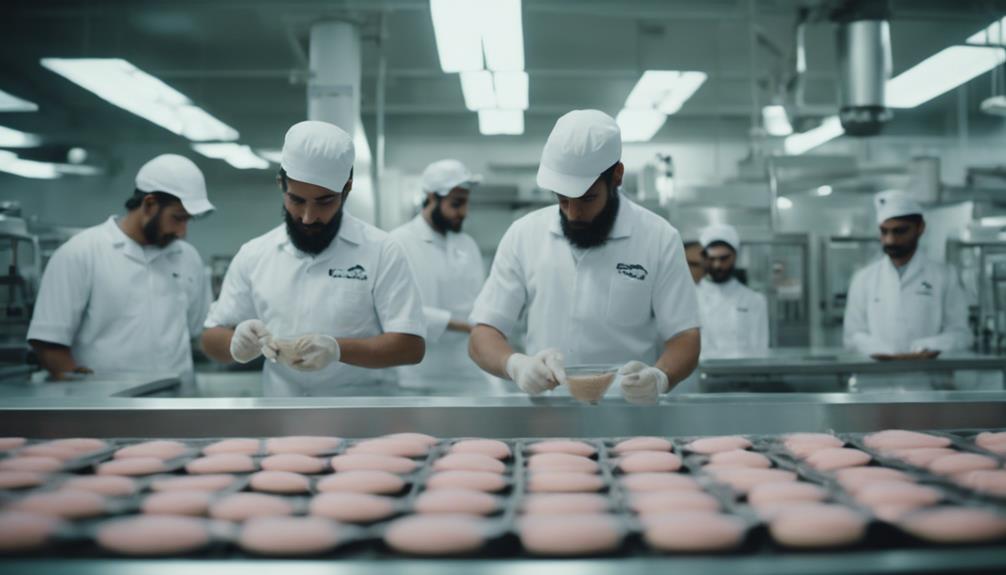
Bulla Ice Cream goes through extensive halal verification processes to guarantee adherence to Islamic dietary regulations. The brand confirms its products are free from non-halal ingredients such as alcohol or pork derivatives, meeting the criteria for being considered halal food. Halal certified logos showcased on Bulla Ice Cream packaging act as a clear indicator of compliance with Islamic dietary laws. Consumers looking for reassurance of Bulla Ice Cream's halal conformity can easily confirm this through the official certification logos prominently featured on the packaging.
The process of obtaining halal certification for Bulla Ice Cream involves a thorough assessment of ingredients used and the production processes followed. This scrutiny ensures that every aspect of the ice cream's production aligns with the requirements established by Islamic dietary regulations.
It's noteworthy that individual preferences and interpretations of halal standards may impact personal decisions regarding consumption of Bulla Ice Cream.
Frequently Asked Questions
Why Is Some Ice Cream Not Halal?
Some ice cream is not Halal due to non-Halal ingredients like gelatin or alcohol. Emulsifiers, stabilizers, and flavors may not meet Halal requirements. Certain products contain pork derivatives. To be Halal, ice cream must follow Islamic dietary laws.
How Does Something Become Halal Certified?
To get Halal certified, verify sourcing, production, and distribution align with Islamic dietary laws. Eliminate alcohol and pork-related ingredients. Regular checks maintain compliance. It's a voluntary process to cater to Muslim consumers' dietary needs.
What Are the Requirements for Halal Products?
Do you know the requirements for halal products? They must be free from forbidden ingredients and adhere to Islamic dietary laws. Halal certification guarantees compliance and maintains trust among consumers in the halal status of products.
How Do You Know if Food Is Halal Certified?
To know if food is halal certified, look for the official logo on the packaging. Verify with recognized authorities. Halal certification guarantees compliance with Islamic dietary rules. It indicates no haram ingredients. Trust the certification for meeting halal standards.
What Are the Requirements and Certification for Halal Ice Cream, and How Does It Apply to Drumstick Ice Cream?
In order for a drumstick ice cream to be considered halal, it must meet the requirements set out by halal certification organizations. This includes using halal-certified ingredients, adhering to specific processing methods, and obtaining certification from a recognized halal authority. Consumers can find drumstick ice cream halal answers by looking for the halal certification symbol on the packaging.
Can Ice Cream University Certify Ice Cream as Halal?
Ice Cream University is not a real institution. However, it is important to understand what is ice cream university before believing any claims about halal certification. Islamic scholars or institutions oversee the certification process, ensuring that ice cream meets the dietary requirements of halal.
Conclusion
So, now you know how ice cream can be halal! Understanding the requirements and certification process is key to ensuring the delicious treat meets religious standards.
With essential ingredients like milk fat and critical emulsifiers being Halal compliant, you can enjoy your favorite ice cream guilt-free.
Remember, choosing Halal certified ice cream like Bulla Ice Cream isn't just a religious obligation, but also a tasty way to treat yourself!
